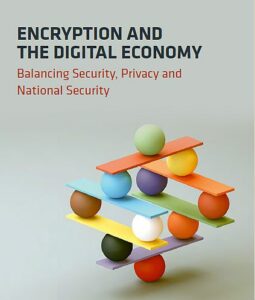
Data Security Council of India (DSCI) has launched a whitepaper on encryption titled “Encryption and the Digital Economy: Balancing Security, Privacy and National Security”. The paper offers a holistic viewpoint on the more extensive encryption debate by engaging with stakeholders within academia, government, law enforcement, as well as the industry. The DSCI Whitepaper on Encryption endeavors to widen the horizon around encryption deliberations and bring up the technical, moral, and law enforcement complexities, encryption creates as we attempt to secure personal data and digital services through end-to-end encryption (E2EE).
DSCI is a premier industry body on data protection in India, set up by NASSCOM, committed to making cyberspace safe, secure, and trusted by establishing best practices, standards, and initiatives in cybersecurity and privacy. DSCI brings together governments and their agencies, industry sectors including IT-BPM, BFSI, Telecom, industry associations, data protection authorities and think tanks for public advocacy, thought leadership, capacity building, and outreach initiatives.
 The DSCI Whitepaper on Encryption extends a deep dive into various perspectives from law enforcement to technology companies, governments, and users. It also provides a detailed overview of the regulatory landscape in India and around the globe on the benefits and challenges of encryption and encryption challenging interventions. The paper offers a comprehensive breakdown of various facets, ranging from encryption’s historical and legal context to the technical and constitutional considerations of breaking E2EE and traceability. It also advises the user to look at encryption as a complex tool with a broad and varied impact that has both primary effects and consequences and secondary implications in criminal justice and law enforcement.
The DSCI Whitepaper on Encryption extends a deep dive into various perspectives from law enforcement to technology companies, governments, and users. It also provides a detailed overview of the regulatory landscape in India and around the globe on the benefits and challenges of encryption and encryption challenging interventions. The paper offers a comprehensive breakdown of various facets, ranging from encryption’s historical and legal context to the technical and constitutional considerations of breaking E2EE and traceability. It also advises the user to look at encryption as a complex tool with a broad and varied impact that has both primary effects and consequences and secondary implications in criminal justice and law enforcement.
Delivering her remarks at the launch of the DSCI whitepaper on encryption, Rama Vedashree, CEO, DSCI, said, “Encryption has become a ubiquitous part of digital products and platforms and is the necessary protection that underpins digital transactions. Our paper looks at encryption not simply as a security tool but rather places it in the larger narrative around individual privacy, national security, human rights, and the digital economy. It’s important to approach this in a holistic manner and engage all stakeholders in progressive policy-making.”
Prof. Subhashis Banerjee, Professor, IIT-D, said, “End-to-end encryption and traceability are contentious issues for which informed nation-wide debate is essential. I congratulate DSCI for its whitepaper on encryption which can provide valuable inputs for such debates. We also require comprehensive threat models for both privacy and national security requirements without which a complete understanding of the problem at hand will remain elusive.”






















